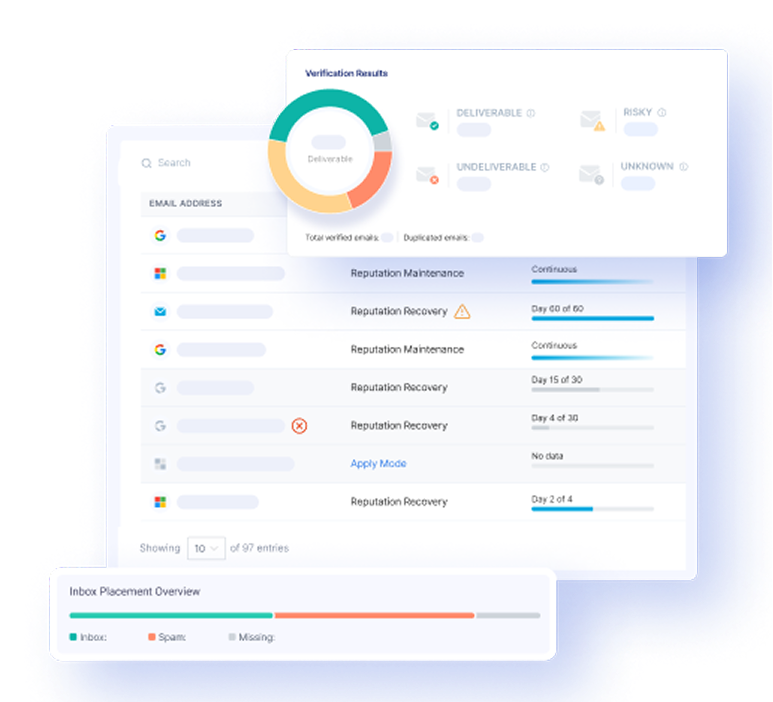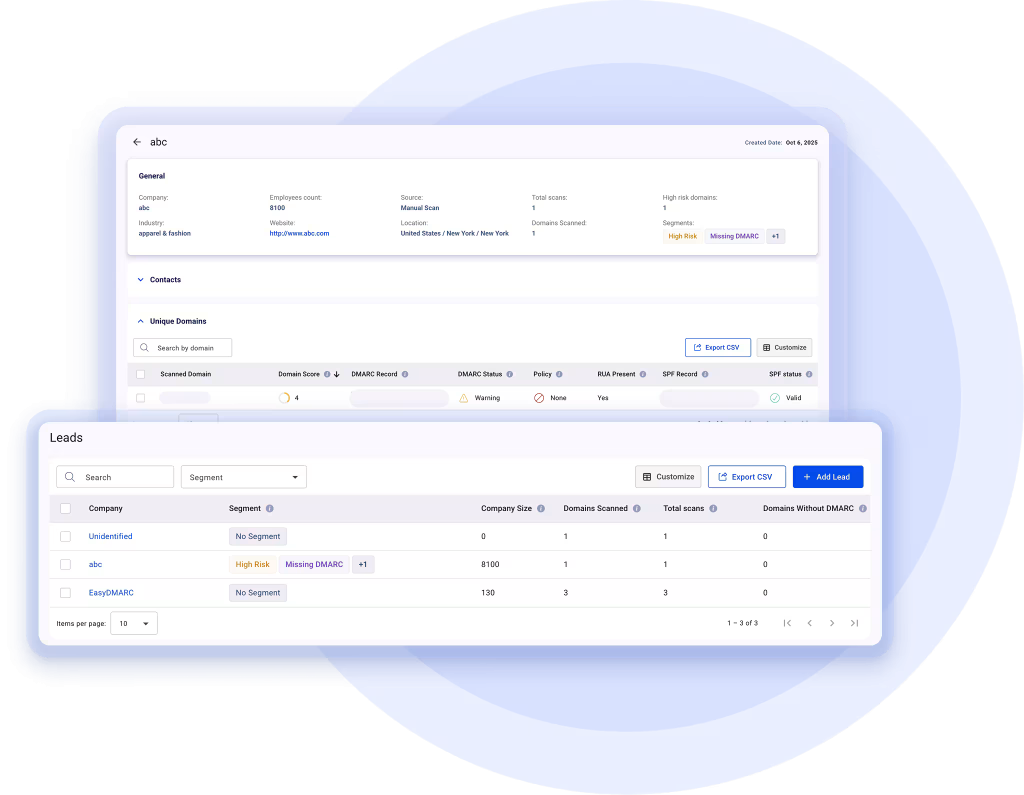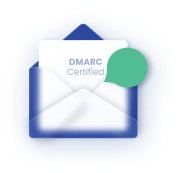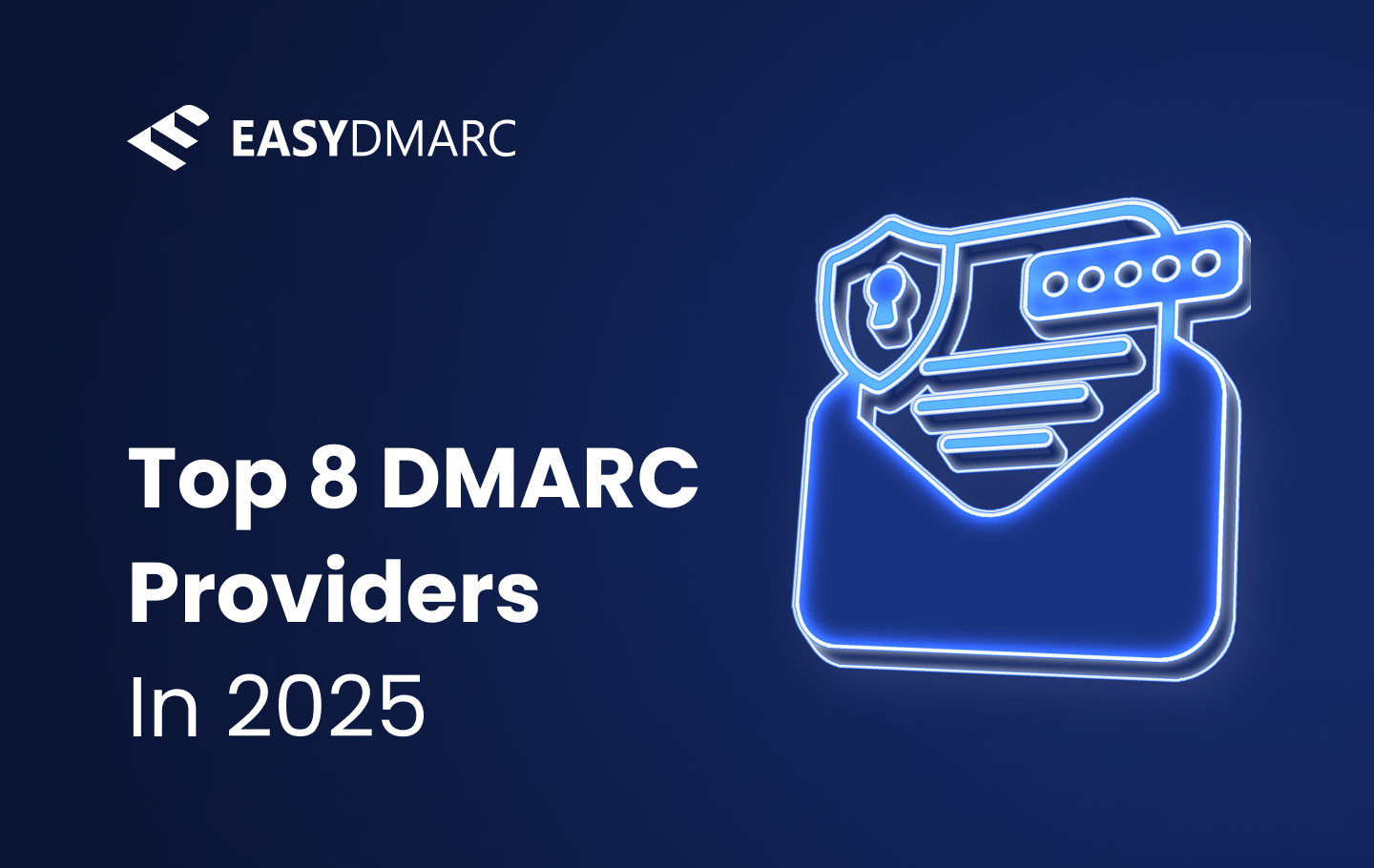DMARC (Domain-based Message Authentication, Reporting, and Conformance) is an email authentication protocol that helps organizations protect their domains from phishing, spoofing, and unauthorized use. As email remains a primary communication tool for enterprises, securing outbound messages has become a vital part of any cybersecurity strategy.
Configuring DMARC manually can be complex, involving DNS updates, policy alignment, and constant monitoring. This is where professional DMARC providers come in. A reliable DMARC service provider simplifies deployment, ensures policy enforcement, and offers visibility into email authentication results. With 2024 marking stricter authentication requirements by Google and Yahoo, the demand for trusted DMARC vendors has surged ever since.
In this article, we’ll explore the top 9 DMARC providers in 2025, their key features, and how each DMARC solution can strengthen your organization’s email security posture.
Why Do You Need a Good DMARC Provider?
A good DMARC provider helps businesses manage authentication efficiently and keep their domains safe from misuse. Here are four key things a reliable provider helps you with:
Simplify DMARC Deployment
They make DMARC setup quick and accurate with automated tools that generate and check DMARC records. This ensures your DMARC service is correctly configured without manual errors.
Offer Centralized Monitoring
A trusted DMARC vendor provides real-time dashboards to track authentication results, detect anomalies, and monitor all sending domains from one place.
Convert Complex Reports into Insights
Raw XML reports can be hard to understand. A good DMARC service provider converts XML reports into clear visual summaries, helping you identify unauthorized senders or delivery issues easily.
Guide Policy Enforcement
Moving from a relaxed “none” policy to full enforcement can be tricky. The best DMARC solutions guide you through this process safely, ensuring legitimate emails are delivered while blocking spoofed ones.
A good provider doesn’t just deploy DMARC; it helps you maintain and optimize it for ongoing email security.
Key Features of DMARC Service Providers
When choosing a DMARC solution for your domain, focus on the features that simplify management and strengthen your overall email security. A good DMARC provider should offer scalability, fraud prevention, and detailed reporting to help you protect multiple domains, monitor traffic, and gain clear insights into authentication performance.
Here are the key features to look for and why they matter.
1. Support for Growth and Multi-Domain Management
Large organizations often handle several domains, subdomains, and email systems. A reliable DMARC service provider should allow you to manage all of them under one account. Look for tools that support bulk domain onboarding so you can easily add and monitor new domains as your business grows.
2. Continuous Visibility and Data-Driven Insights
A good DMARC monitoring solution should provide live reporting and analytics to help track authentication results, detect phishing attempts, and analyze SPF, DKIM, and DMARC policy compliance. This ensures you have full visibility into your domain’s email activity.
3. Automated Policy Management and Enforcement
Automation helps maintain consistency and reduces manual work. The best DMARC vendors offer tools to automatically enforce policies such as “quarantine” or “reject,” ensuring that suspicious emails are blocked while protecting your brand’s reputation.
4. Custom Dashboards and Alerts
A customizable dashboard gives a unified view of all your domains. Look for platforms that offer visual analytics and alert systems to notify you of issues like increased authentication failures, helping your team respond quickly to potential threats.
5. Simplified Setup and Expert Assistance
Effective DMARC implementation can be complex. Choose a DMARC service that offers guided setup, user-friendly integration, and access to DMARC engineers or product specialists who can assist when needed.
6. Intelligent Threat Detection and Phishing Defense
Top DMARC solutions combine authentication data with threat intelligence to identify and stop phishing, spoofing, and impersonation attempts before they impact users. Real-time alerts and detailed insights make your defenses proactive rather than reactive.
7. In-Depth Forensic and Aggregate Reporting
Comprehensive DMARC reports help pinpoint authentication failures, sender IPs, and technical issues behind blocked or spoofed emails. These insights are essential for refining your email security strategy and ensuring continuous protection.
Top 9 DMARC Providers In 2025
Choosing the right DMARC provider can make all the difference in how effectively you protect your domain from phishing and spoofing. Here are the top DMARC service providers of 2025, known for their reliability, scalability, and advanced email security features.
EasyDMARC
EasyDMARC offers one of the most complete DMARC solutions for enterprises, with strong multi-domain support, automated policy enforcement, and hands-on technical assistance. What sets it apart is its dedicated team of DMARC engineers and support staff who help organizations configure, monitor, and optimize their email authentication setup.
The platform’s centralized dashboards make it ideal for businesses managing multiple domains. It integrates essential tools like DMARC, SPF, DKIM, and DNS management into one user-friendly interface.
Here are the key features of EasyDMARC that attract and retain users:
Complete Managed Services
Enterprise users get end-to-end support, including DMARC, SPF, DKIM, and BIMI setup, DNS configuration, and ongoing monitoring. Quarterly security reviews and 24/7 assistance help maintain enterprise compliance and prevent misconfigurations across all domains.
Smart Reporting and Insights
EasyDMARC converts complex raw XML reports into clean visual dashboards. These help teams identify authentication issues, monitor trends, and measure the success of their DMARC service over time.
EasySPF Automation
The EasySPF module simplifies SPF record management by automating setup and applying dynamic flattening. This prevents DNS lookup errors and ensures stable email authentication, even across multiple service providers.
Real-Time Alerts
The platform sends instant notifications about critical issues like DNS changes or alignment failures. Alerts can be customized to highlight high-priority risks, helping teams respond faster to potential threats.
Intuitive Interface
With a simple and organized design, EasyDMARC’s dashboard makes navigation easy even for non-technical users. It provides a clear view of domain health, reports, and enforcement status for quick decision-making.
Dedicated Expert Support
Each enterprise account gets a dedicated DMARC specialist who offers personalized guidance on policy setup, enforcement, and issue resolution, backed by 24/7 email support.
Comprehensive Audit Logs
Every change made on the platform, such as DNS edits, policy updates, or access modifications, is recorded with timestamps and user details. This improves transparency, security, and compliance tracking across large teams.
Sendmarc
Sendmarc is a DMARC provider built to help small and mid-sized businesses improve their email security without needing deep technical expertise. It focuses on simplifying DMARC, SPF, and DKIM setup and policy management through a clean, guided interface. The platform gives users a clear view of their domain’s authentication status and helps them move toward stronger policy enforcement at a steady pace.
Pros
- Straightforward and easy-to-use dashboard.
- Provides essential tools for DMARC monitoring and gradual policy adoption.
- Good choice for smaller teams managing limited domains.
Cons
- Setup can take some time for users new to DNS or authentication records.
- Reporting features are basic compared to more advanced DMARC solutions.
- It may not suit enterprises that require detailed analytics or multi-domain scalability.
Mimecast
Mimecast offers a managed DMARC solution built for large organizations that need visibility and control over their email authentication setup. It helps enterprises monitor SPF, DKIM, and DMARC alignment and gradually move toward enforcement with guided assistance. The platform focuses on giving users a clear view of email traffic patterns and authentication results.
Pros
- Simple and organized interface suitable for enterprise use.
- Detailed insights into email traffic and authentication performance.
- Includes expert support for setup, troubleshooting, and policy enforcement.
Cons
- Does not include built-in AI or advanced threat intelligence tools.
- Pricing can be high for small or mid-sized businesses.
- Some users report limited customization in reporting and dashboard options.
OnDMARC by Red Sift
OnDMARC is a cloud-native DMARC service built for organizations that want to simplify email authentication and enforcement at scale. It offers tools for managing SPF, DKIM, DMARC, and MTA-STS from a unified platform, with real-time diagnostics and DNS monitoring to help prevent fraud and misconfigurations.
Pros
- Simplifies SPF lookup issues via a “Dynamic SPF” mechanism.
- Good visibility via dashboards and alerting for authentication errors, assets, and sending sources.
Cons
- Advanced features may feel complex for new users.
- Pricing and plans are unsuitable for smaller businesses.
- Limited custom analytics for detailed reporting.
DuoCircle
DuoCircle is a DMARC solution aimed primarily at organizations that want clear visibility into email authentication and reporting. The platform offers tools to publish DMARC records, analyze incoming aggregate and forensic reports, and monitor domain activity. It focuses on helping users interpret what their email traffic is doing and whether their SPF, DKIM, and DMARC policies are being correctly applied.
Pros
- Good support for interpreting XML-based DMARC reports and converting them into readable summaries.
- Accessible for smaller teams wanting to start monitoring multiple domains without heavy overhead.
- Expert guidance with email authentication deployment and enforcement.
Cons
- The platform lacks strong advanced threat intelligence or automated enforcement features, limiting its ability to proactively block spoofing.
- Fewer integrations or advanced analytics compared to larger enterprise-grade DMARC vendors, making it less suited for complex or high-volume email ecosystems.
- Some users report that moving beyond monitoring (into full enforcement mode) can require more manual effort and custom setup.
Valimail
Valimail is a leading DMARC vendor known for helping businesses automate email authentication and protect against impersonation attacks. It focuses on quick policy enforcement and continuous monitoring, making it a suitable choice for mid-sized and enterprise organizations. With its zero-trust approach, Valimail ensures that only verified senders can use your domain while improving email deliverability and sender reputation.
Pros
- Automated and simplified DMARC policy enforcement.
- Zero-trust model for enhanced email authentication.
- Detailed visibility through reports and monitoring tools.
Cons
- Pricing is on the higher side for smaller businesses.
- Does not include MTA-STS or TLS-RPT configuration options.
- Setup can be complex for users new to DNS management.
- Free plan offers limited functionality.
DMARCLY
DMARCLY is a DMARC provider built for small businesses that want a simple and affordable way to protect their domains from spoofing and impersonation. It offers easy setup for DMARC, SPF, DKIM, MTA-STS, and TLS-RPT, along with adaptive blacklist monitoring to detect suspicious sender activity. Its user-friendly dashboard and straightforward reporting make it a solid starting point for companies new to email authentication.
Pros
- Quick onboarding and easy setup, suitable for beginners.
- Includes MTA-STS and TLS-RPT deployment support.
- Offers adaptive blacklist monitoring for better visibility.
- Affordable pricing for small organizations.
Cons
- Lacks advanced threat intelligence and analytics features.
- Limited scalability for large or multi-domain enterprises.
- Fewer hosted and automation options compared to enterprise-grade DMARC solutions.
Agari
Agari (Forta) is an enterprise-focused DMARC solution that combines email authentication with threat detection. It supports enforcing DMARC policies, monitoring third-party senders, and integrating with threat intelligence feeds. It’s designed for large organizations that need extensive domain protection and brand abuse defense.
Pros
- Strong source authentication support to identify all senders across domains and third-party services.
- Integrates with threat intelligence and SOC workflows, helping detect impersonation and domain-spoofing campaigns.
- Suitable for complex infrastructures with large volumes of email, multiple domains, and compliance demands.
Cons
- Setup and onboarding are resource-intensive, often requiring significant time and dedicated staff.
- Cost and plan complexity may make it impractical for smaller teams or single-domain businesses.
- Advanced analytics and integrations exist, but basic users may find the dashboard overwhelming and less intuitive.
Comparison At a Glance
Here is a quick comparison between the top 9 DMARC service providers of 2025-
| Provider | Best For | Key Strength | Pricing Tier |
| EasyDMARC | SMBs, MSPs, and Enterprises | Comprehensive features with simplicity and great support | $$ – Mid-range |
| Sendmarc | Small to Mid-sized Businesses | Easy onboarding and guided DMARC setup | $ – Budget-friendly |
| Mimecast DMARC Analyzer | Large Enterprises | Deep visibility and managed enforcement | $$$ – Premium |
| OnDMARC (Red Sift) | Mid to Large Businesses | Real-time diagnostics and dynamic SPF management | $$ – Mid-range |
| DuoCircle | Small Businesses | Straightforward monitoring and report visualization | $ – Affordable |
| Valimail | Mid to Large Organizations | Zero-trust model and automated policy enforcement | $$$ – Premium |
| DMARCLY | Small Businesses & Startups | Simple setup and adaptive blacklist monitoring | $ – Budget-friendly |
| Agari (Forta) | Large Enterprises | Enterprise-grade authentication with threat intelligence | $$$ – Premium |
Why EasyDMARC Stands Out Among the List?
Among all the DMARC providers reviewed, EasyDMARC stands out for its balance of simplicity, scalability, and depth. It brings enterprise-level functionality, like smart authentication tools, strong audit logs, and insightful monitoring, into an easy-to-use platform suited for both SMBs and MSPs.
Its transparent pricing, responsive support, and intuitive interface make implementation effortless, while advanced features like domain grouping and performance optimization ensure long-term reliability. EasyDMARC remains a top choice for organizations that want power, clarity, and proven protection in one solution.
Final Thoughts
Choosing the right DMARC provider can significantly impact how effectively your organization protects its email domain, brand reputation, and customer trust. Platforms like Mimecast and OnDMARC offer scalability, automation, and visibility to help businesses maintain full control over their outbound email ecosystem. Smaller organizations can also find reliable and affordable tools like DMARCLY or Sendmarc to get started on their authentication journey.
Ultimately, a strong DMARC solution should simplify implementation, provide real-time monitoring, and guide you from deployment to enforcement with minimal friction. Among all the options, EasyDMARC stands out as the most balanced, intuitive, and future-ready choice. Its advanced features, transparent pricing, and hands-on expert support make it the ultimate DMARC vendor for organizations that value both simplicity and security.
Frequently Asked Questions
Manually configuring DMARC can be complex and time-consuming. A reliable DMARC provider automates DNS record setup, report analysis, and policy enforcement. This reduces the chance of misconfigurations and helps you reach full protection faster while ensuring that legitimate emails continue to deliver properly.
A DMARC solution authenticates every outgoing email using SPF and DKIM. When a message fails authentication, it can be quarantined or rejected based on your DMARC policy. This ensures that only authorized senders can use your domain, preventing impersonation and phishing attacks.
When selecting a DMARC service provider, look for scalability, automation, real-time reporting, and strong support. Consider your domain size, email volume, and whether you need extra features like MTA-STS, BIMI, or AI-based threat detection. A demo or trial period helps test usability before committing.
The timeline varies depending on your email ecosystem, but with a good DMARC vendor like EasyDMARC, enforcement typically takes a few weeks to a few months. Providers guide you through gradual enforcement, from “none” to “quarantine” to “reject,” ensuring no legitimate mail gets blocked.
EasyDMARC stands out for combining simplicity with enterprise-grade power. It offers automated record management, detailed reporting, multi-domain control, and strong audit logs. The platform’s transparent pricing, dedicated support, and user-friendly interface make it a trusted choice for both SMBs and large organizations.





